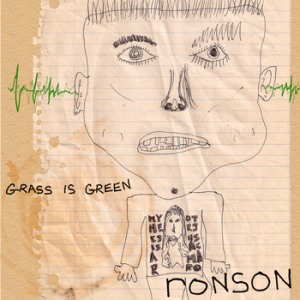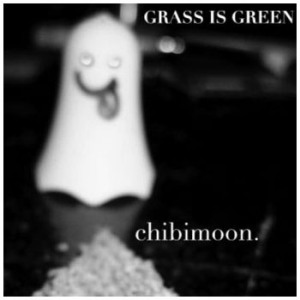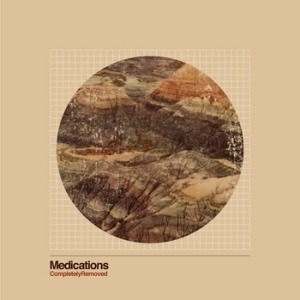
Approximately a minute and a half into my first spin of “Jesse’s Fashion Show,” the third song on Grass Is Green’s recently issued Ronson, I started getting the sense that the group made a quantum leap forward since 2011’s Chibimoon, like if my three-month-old daughter walked over to me and asked me to put on Fugazi’s Red Medicine. This feeling kept solidifying as the song continued and at exactly 3:13, it became a certainty: I wholeheartedly endorse whatever illegal riff-growth-hormone Grass Is Green imported from Mexico last year. They haven’t entirely lost the anxious angularity that appealed to me on Yeddo and Chibimoon, but the teasing nature of those albums—flashing a superb Polvo-meets-Faraquet passage in “Slow Machine,” then suddenly abandoning it—has been replaced by a new philosophy: write a great riff, then one-up it with a better one, then one-up it with a better one…
It’s a tall order to get past how smartly constructed “Jesse’s Fashion Show” is (the vocals dropping out midway through its four-minute runtime to prioritize the nimble lead exchanges, for one), but Ronson offers other expansions of Grass Is Green’s portfolio. “Panera” is the tightest, catchiest song they’ve written; it would have merited inclusion in nearly every mix tape I mailed out from 1997–2000. The slow-burning “Somebody’s Something” finds deeper catharsis with “It’s getting hard to ignite those kerosene eyes / Difficult for everyone else,” then allows Andy Chervenak’s vocals get overtaken by a pitch-perfect closing guitar part. The instrumental “Ruffleball” ends Ronson with satisfyingly bright interplay between the four members before fading to black. If you’d told me Grass Is Green had mastered any of these moves on their third album, I would have been impressed, but all of them? I’m still scratching my head.
It might sound like I’m disparaging Grass Is Green’s previous efforts, but it’s hard to go back to earlier records after a big leap. Returning to The Dismemberment Plan’s ! after Is Terrified proved largely impossible, I spent considerably less time with Smart Went Crazy’s worthy Now We’re Even after acquiring the superior Con Art, Shiner’s Starless felt like a dry run at a four-piece edition of Shiner after The Egg was birthed, et cetera. My question for Grass Is Green, now that they’ve written a score of guitar riffs I uncontrollably sing along to, is this: Where does Ronson fall in their evolutionary curve? Returning to the Dismemberment Plan comparison, is their Emergency & I coming up? That is what I’m so excited about: if they made this enormous leap for Ronson, imagine what could be next. Am I going to break my hands drumming on my steering wheel?
No pressure, guys.
|

Here’s a tip for all press agents sending digital one-sheets to my inbox: If you cite Fugazi, Jawbox, and Smart Went Crazy in the first line of the e-mail, I will check out the album and/or see the band live. Fugazi and Jawbox are a good start, but anybody citing Smart Went Crazy in 2011 earns my trust. It obviously helps if the band sounds like Fugazi, Jawbox, or Smart Went Crazy, but there’s only one way for me to find out, right? Even if you’re lying, I’ll appreciate the effort. Anything to keep “Animal Collective, Paul Simon’s Graceland, and Pet Sounds-era Beach Boys” from being applied to the newest, hottest post-chillwave record.
In the case of Grass Is Green, my excitement was doubled because those references were coming from a Boston-based group. As it turns out, three-quarters of the group are transplants from Rockville, MD, a more natural locale to be weaned on Dischord’s finest, but that fact doesn’t kill the buzz. I am drawn to math-rock guitar figures and time-signature changes like a moth to the flame, and Grass Is Green offers enough of both to make me into a burnt husk on the floor.
Don’t expect a straight hybrid of the aforementioned bands. There’s a lot of Polvo/Rectangle weirdness floating around, specifically the juxtapositions between frenetic guitar interchanges and unexpected bouts of melodic pacification. Smart Went Crazy and Fugazi register for the DC reference points, but the clearest touchstone would be a twitchier take on Faraquet’s ever-shifting math-rock, and not just because Devin Ocampo mastered their first album, Yeddo. With a few welcome exceptions, Grass Is Green aren’t prone to standing still.
It’s easy to extend that tendency to the group’s output. The ten-track Yeddo was released on Bandcamp last September, followed up in March by the seven-track Chibimoon. That’s a remarkably quick turnaround for a band bartering in jagged guitar shapes. Credit the ease of digital distribution and/or an overflow of material. Fortunately, you can grab both of these albums for a whopping $10.
The distinction between Yeddo and Chibimoon is noticeable, if by no means absolute. The former has cleaner hooks and more straight-ahead momentum, the latter has sharper left turns and greater changes in pace. Yeddo is still off-kilter, but the melodies of “No Legs,” “Feeling Different,” and “Tricky Tim’s ‘Night on the Town’” ring through the knotty thicket of guitars and percussion. The aggressively antsy “Uhm Tsk” hits the raucous energy of early Les Savy Fav, and was the highlight of their set when I caught them earlier this year.

Chibimoon is better at showing its range. Opener “Slow Machine” cycles through several whiteboards worth of passages, but never tops its hooky “Drift into the magic hour” part. “Boat Show” and “Chibimoon” start off with uncharacteristic calm, but the cathartic climax of the title track is the highlight of the record. The rollicking “Tongue in Cheek” hits its stride with a drum-crazed mid-section. “Twinkle Toes” is likely as close to a slow jam as Grass Is Green will write. This split between fifth-gear discord and lilting lullabies can make your head spin.
Even within the realm of high-energy, DC-inspired math-rock, there’s an awful lot going on in both Yeddo and Chibimoon. Grass Is Green’s compositional restlessness is both a blessing and a curse, bringing in a surplus of ideas but occasionally ushering the best ones out too soon. The easiest solution would be to cherry-pick each record, grabbing some satisfyingly skewed rockers from Yeddo and the calmer and/or weirder moments from Chibimoon, but you’d inevitably miss out on memorable passages. It’s better to get both albums and work through the knots.
Special Boston-area note: Grass Is Green is on a bill with the excellent Me You Us Them, Grandfather, and Pile at Great Scott on September 1. If you miss that superb bill, you can catch them again at the Middle East Upstairs on September 29 with fuzzed-out indie rockers Young Adults.
|
Medications – Completely Removed LP – Dischord, 2010 – $11 (4/10 Dischord Mail Order)

The DC scene seems averse to giving out such honors, but Devin Ocampo needs a lifetime achievement award. Having first come on my radar as the drummer for Smart Went Crazy’s excellent Con Art, Ocampo soon resurfaced as the singer and guitarist for the math-rock trio Faraquet. People usually reference their lone full-length, The View from This Tower, and with good reason (it is awesome), but it was the “The Whole Thing Over” b/w “Call It Sane” single that impressed me the most. Math-rock is notoriously afraid of hooks, but Ocampo coupled the nimble guitar figures in “Call It Sane” with some brain-burrowing melodies. (It’s included on their Anthology 1997-1998 LP. Go get it.) His post-Faraquet output has been similarly impressive. Ocampo and Faraquet drummer Chad Molter formed Medications, granting Molter his own switch from the kit to (primarily) bass duties. Medications' self-titled debut EP and 2005 LP Your Favorite People, All in One Place pull Faraquet’s style in new, often opposing directions, both with more open hooks and knottier rhythms. Ocampo returned to drumming duties for Mary Timony’s excellent Ex Hex and The Shapes We Make LPs, the latter including Molter on bass. Ocampo’s involvement was exactly what Timony’s solo career needed—Ex Hex was her most memorable album since Helium’s The Magic City, grounding her songs with muscular, decidedly DC rhythms. Along with Molter, he’s now a full member of Beauty Pill, having contributed to their 2005 full-length The Unsustainable Lifestyle. Have I mentioned his production skills? I certainly will when I track down the Imperial China full-length, Phosphenes. Just give the guy a trophy already.
Three things stand out to me about Ocampo’s career: 1. He’s versatile; 2. He’s a team player; 3. He’s consistently great. When drummer/guitarists are mentioned, it’s usually Dave Grohl and Damon Che (of Don Caballero / Thee Speaking Canaries), but Ocampo’s success on both fronts is just as impressive, even if it’s grossly overlooked. Unlike Che (I’ll give Grohl some leeway for stepping in for Killing Joke’s 2003 self-titled LP), who dominates any project he’s involved in, Ocampo’s non-frontman contributions make those bands, those records better without turning them into the Devin Ocampo show. That isn’t to say Ocampo’s the only reason why Smart Went Crazy improved so much between Now We’re Even and Con Art, or why Mary Timony got her mojo back with Ex Hex, but some credit must be given. After all, Ocampo hasn’t been part of a disappointing album. When the advanced press on Completely Removed promised something notably different from Your Favorite People, I wasn’t even slightly concerned. I was excited.
This advertised difference is apparent in the line-up. Drummer Andrew Becker departs, replaced in part by “swingman” Mark Cisneros, but the bigger development is emergence of Chad Molter as a co-frontman. Ocampo and Molter trade off vocals on most tracks on Completely Removed, in practically every permutation (“Rising to Sleep” involves a trade-off on the syllable level). Unlike other multi-singer bands, there’s no sense of needing to balance the two egos, since Ocampo and Molter have been friends and collaborators long enough not to worry about such things. Instead, democracy dominates. Molter’s softer voice contrasts well with Ocampo’s ability to hold a note with unwavering intensity. I now recognize a key issue with the lifetime achievement award I just doled out to Devin Ocampo. I can’t help but feel guilty in not including Chad Molter when they’re bound so firmly at the hip. Molter’s the unsung hero of this group and this album—these songs come off as musical conversations between the two (with the occasional witty retort from Cisneros) and quoting only one side of the conversations seems silly.
Becker’s absence is felt more in the instrumental balance of the songs. Gone are the tense rhythm-driven workouts like “Twine Time” and “Opinions” from Your Favorite People. Such time signature changes and fretboard tangles have mellowed, gaining notable ease on the airy “Brasil ’07,” which trades complex chord changes for vibes and horns. As much as I love the intensity of “Surprise!” and “Pills” from Your Favorite People, that album isn’t the easiest to sit through from start to finish. In contrast, Completely Removed is a natural driving-around album for summer. The dominant elements of the songs are usually melodic guitar leads or vocal hooks, not intricate, forceful rhythms or finger-twisting guitar riffs. It’s not that those elements are completely gone—“Home Is Where We Are” reminds me of an updated take on the beloved “Call It Sane,” “Long Day” intertwines arpeggios with aplomb, and “Kilometers and Smiles” brings out some gnarly ’70s funk leads—but they fit within the songs.
This switch results in Completely Removed being deemed more “pop,” which is both true and limiting. Yes, the album is lighter, hookier, and more approachable than either of Medications' previous releases—all welcome changes. I doubt I’ll find a more repeatable stretch of songs than the opening quartet of “For WMF,” “Long Day,” “Seasons,” and “We Could Be Others” this year. Yet my most basic idea of pop music—as something geared to appeal to a broad audience—doesn’t quite fit here. Medications’ songs are more polished and catchier, but they’re still remarkably cerebral. Take the title track, for example. Ocampo sings, “I’m removed / If not hidden from view… completely removed” and “I wish that I was open / and I wish that I did care,” lines that seem to explore his/their acknowledged distance from the crowd. “We Could be Others” calls back to these lines with its chorus of “We could be open / We could be sober / We can be others I know,” but ends it with “It’s too late / It’s too long.” That’s the tension of Completely Removed: making steps toward the middle, being comfortable with your new position, yet still recognizing that you don’t quite belong. That’s not the sole topic of these songs—“Brasil ’07” is quite the love song for Ocampo’s wife—but I can’t hear “as my human crimes wear thin on you” in “Long Day” without pondering the need to specify “human.”
Being too cerebral for true pop standing shouldn’t be viewed as a negative. Too often I struggle to explain why exactly I go off the beaten path to find new music, especially when I’m talking with people who are content to stick to the pop songs they know and love. But Completely Removed is the perfect example of the rewards of this pursuit. Its combination of hooks and smarts won’t lose its luster once the initial rush has gone away, since the lyrics and arrangements are so richly layered. This is why I follow musicians like Devin Ocampo and Chad Molter, why I’m continually impressed by the ways they evolve as musicians and adapt to fit new surroundings. It’s also why I wouldn’t mind seeing at least one of these guys get an enormous trophy for their efforts.
|
|

